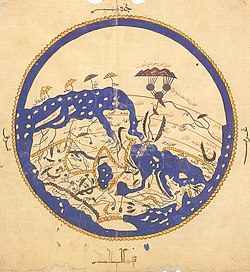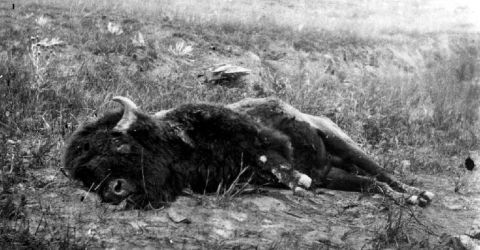
First of all, History is a fact. Something either happened, or it didn't. If someone writes about something that happened, and then someone else writes that it didn't happen, one of the two is wrong.
A good example of this is the common misconception that Columbus discovered the New World, and proved the world was round. Some history books as recently as the 1990s still repeat this.* Columbus did neither of those things. But to say that he didn't could qualify as "revisionist history" to some oddly ignorant and tradition-minded people. Again, something either happens or it doesn't. No revision is necessary because it was a lie, and not actually History.

Map of known world, 1456
Unfortunately, even when all parties agree that an event occurred, there are different ways of interpreting the How and Why of the occurrence. This is where revisionist history comes into play.
I feel that the term is misleading because a Revisionist Historian (such as Howard Zinn) doesn't usually revise any history; rather, he simply adds facts to the story, which leads to broader insight into a historical figure's life or the background of an event. In keeping with the Columbus story, we always knew that in 1492 he sailed the ocean blue from Spain with three ships. With additional information, we now know that not only was he a brave and intrepid explorer, but he was also a greedy man, with little regard for the Arawaks whom he decimated (sailors were encouraged to "take women," and seemed to prefer the 9 and 10 yr olds). This information doesn't negate the fact that he was an explorer, but it serves to remind us that he was far from perfect.

Some Revisionist Historians (just a few) get overzealous, such as when they claim that Thomas Jefferson raped black women. There is no evidence of this; hence, it cannot be considered "fact." What they fail to mention is that Jefferson's nephew could have been the one doing it (they would have shared DNA), or that the sex was consensual, as the prevailing theory says.
Some people were unhappy when the whole Jefferson/Hemings issue came to light, as they felt it tarnished Jefferson's reputation. Why? Would it make him less of a great mind? His wife had died years before - why couldn't he have a lady friend? This new information would merely help to more fully realize Jefferson's character, and view a more complete picture.

If anything could ruin his rep, it would be that God-awful fur he's wearing.
Abraham Lincoln, when debating Douglas, stated he had no intention of bringing about the equality of whites and blacks. Does this make the Emancipation of 1863 less of a step in the right direction?
There are some (Journal of the West, 2001) who believe that the Amerindians would have eventually killed off the bison anyway, particularly after the introduction of the horse. Does this make the deliberate slaughter of the animals in the 19th century by whites any better?

Sometimes there are facts that are unpleasant, or that we don't like to hear. We don't like to think that Helen Keller was a staunch socialist, or that highly educated Woodrow Wilson was racist. That doesn't mean that the facts should be omitted. Doing so results in a 1984 version of history, which can no longer be called history.
The proper term would then be "propaganda."

*For a list of those books, I recommend Lies My Teacher Told Me by James Loewen.
It's only revisionist history when it introduces information into the standard narrative that I don't want to hear. If it's something that supports my already firmly held beliefs then it's just an interesting piece of information.
ReplyDeleteNew interpretations of history in the light of additional information and evolving worldviews are as important as new interpretations of physical data. Einstein's physics was probably "revisionist" to Newtonians, but was a necessary and accurate advancement.
ReplyDeleteMost often it is propaganda to tear down a conservative figure long dead and unable to defend oneself.
ReplyDeleteSo, why are liberals so upset when Texas wants to put back facts of our history into the educational system that were omitted in previous decades? I do not call it revisionist history, I call it politically bias history!!!
ReplyDeleteThe single greatest threat to the liberal movement in America is "Facts".
ReplyDeleteIt must be pointed out that some "revisionists" go too far in looking for any evidence - no matter how insubstantial - to support a revised theory of events that is more palatable to their social consciousness. James Loewen, for example, states categorically that the story of the purchase of Manhattan by the Dutch is a "fable" and "didn't happen". Yet clearly it DID happen. He then goes on to say that even if it did happen, there is no possible way it was sold for the equivalent of 60 guilders. No way would they have sold it for that amount, he says. Okay, so where is his proof? He has none! He also comes up with an alternative story about Canarsie Indians who gypped the Dutch "buffoons" by offering to sell land they had no rights to. And then, again, he has no evidence to back that up. (The source he relies on for this story is a theory put forth by an amateur archeologist 100 years ago.) He doesn't like the story which he feels portrays the Native Americans as foolish in making the deal so he substitutes a theoretical story in which the Native Americans were swindlers (not sure how that is making his case, unless his agenda is to prove the Dutch were "buffoons" as he calls them.) He can't just say that maybe this is a story we should take a closer look at - no he insists that it is all a lie. But he is wrong. And that, to me, damages his credibility on everything else he says. He is all about making bold statements to sell his books and to further his agenda of turning the tables on anyone of white, European descent. He doesn't even bother to hide his own bias in his quest to expose the bias of others.
ReplyDelete